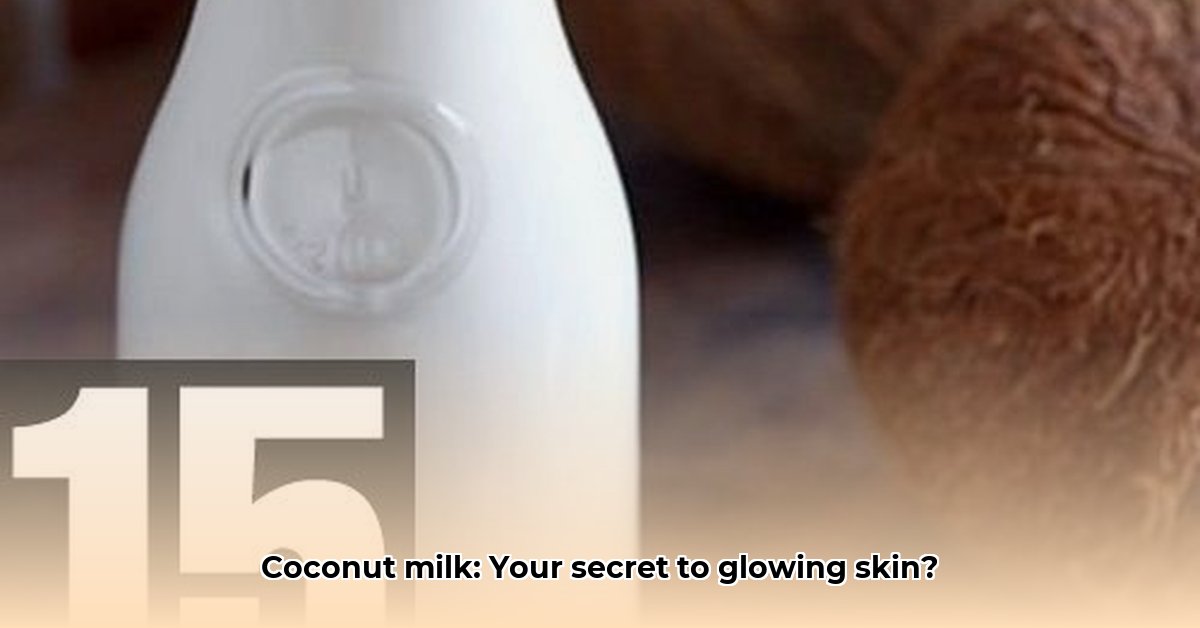
Benefits of Coconut Milk for Skin
Coconut milk, the creamy liquid extracted from coconuts, is more than just a culinary delight; it's emerging as a potential skincare hero. But does the hype surrounding its skin benefits hold up to scientific scrutiny? Let's delve into the facts.
Hydrating Your Skin: A Natural Moisture Boost
Dry, flaky skin? Coconut milk's rich composition of fatty acids, particularly medium-chain triglycerides (MCTs) like lauric acid (a type of saturated fat), acts as a natural moisturizer. These MCTs penetrate the skin, replenishing moisture and leaving it feeling soft and supple. Many individuals report improved skin hydration after using coconut milk.
Soothing Irritated Skin: Nature's Gentle Calming Agent
Beyond hydration, coconut milk possesses anti-inflammatory properties. This makes it potentially beneficial for soothing irritated skin, such as sunburn or minor rashes. While anecdotal evidence abounds, further research is needed to fully understand its efficacy in treating various skin irritations.
Gentle Cleansing: Removing Makeup Naturally
Coconut milk's creamy texture can effectively remove makeup and impurities without harshness. It's a gentle cleanser that also moisturizes, offering a 2-in-1 approach. However, thorough rinsing is essential to avoid any residue. Is it truly as effective as dedicated makeup removers? More research is needed to definitively answer that question.
Coconut Milk vs. Coconut Oil: What's the Difference?
Both boast skincare benefits, but differ significantly. Coconut oil is predominantly fat, while coconut milk contains a broader range of nutrients. Some suggest coconut milk's processing may preserve beneficial vitamins and minerals, but more research is needed to confirm this.
Putting it to the Test: Easy DIY Coconut Milk Skincare Recipes
Ready to experience the benefits firsthand? Try these simple recipes:
1. DIY Coconut Milk Moisturizer:
- Cleanse your face.
- Gently apply a thin layer of coconut milk.
- Let it absorb (a few minutes).
- Apply your usual serum and moisturizer (optional).
2. Soothing Coconut Milk Face Mask:
- Combine 1 tbsp coconut milk with 1 tsp honey or plain yogurt.
- Apply evenly to clean skin.
- Relax for 15 minutes.
- Rinse thoroughly.
3. Gentle Coconut Milk Makeup Remover:
- Gently massage a small amount onto your face to remove makeup.
- Rinse thoroughly.
Important Considerations: A Balanced View
While promising, more research is crucial to confirm coconut milk's efficacy for various skin conditions. Large-scale studies are underway. Also, individual skin reactions vary. Always perform a patch test (inner wrist) before widespread application to check for irritation or allergic reactions. Sensitive skin types should proceed cautiously.
"Coconut milk shows promise, but more research is vital to understand its full potential and effect on diverse skin types," says Dr. Evelyn Reed, Dermatologist at the University of California, San Francisco.
How to Use Coconut Milk for Eczema Relief
Key Takeaways:
- Coconut milk's moisturizing properties may help soothe eczema.
- However, its salicylate content can worsen eczema in sensitive individuals.
- A patch test is crucial before use.
- A low-salicylate diet may be beneficial.
- Coconut milk is a complementary treatment, not a replacement for medical advice.
Understanding Coconut Milk and Eczema
Eczema, or atopic dermatitis, is a chronic inflammatory condition. While coconut milk's fatty acids offer moisturizing benefits, its salicylate content can trigger allergic reactions in some individuals, worsening eczema symptoms. This presents a crucial consideration for those with salicylate sensitivity.
How to Use Coconut Milk for Eczema Relief (Cautiously!)
- Patch Test: Apply a small amount to a discreet area for 24-48 hours. Monitor for reactions.
- Small Application: If the patch test is successful, apply a small amount to an affected area and monitor.
- Frequency: Start with once daily; reduce frequency if irritation occurs.
- Unrefined Coconut Milk: Opt for unrefined, organic coconut milk.
- Combine with Other Treatments: Use coconut milk alongside prescribed treatments, not as a replacement.
"Always consult a dermatologist before using coconut milk or any other alternative treatment for eczema," advises Dr. Anya Sharma, Dermatologist at Cleveland Clinic.
Weighing the Pros and Cons
| Pros | Cons |
|---|---|
| Potential moisturizing and soothing effects | Can worsen eczema in salicylate-sensitive individuals. |
| Readily available and affordable | May not be suitable for all eczema types or severities. |
| May reduce dryness and itching (for some) | Requires a patch test; individual tolerance may vary significantly. |
Additional Considerations
A low-salicylate diet could be beneficial. Discontinue use immediately and consult a dermatologist if symptoms worsen. Remember, individual skin responses vary.